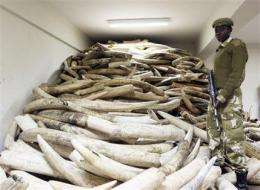UN rejects Tanzania request for one-off ivory sale

(AP) -- A proposal by Tanzania to weaken the 21-year ban on ivory sales was rejected by a U.N. conservation meeting over fears the African country has been failing to crack down on rising incidents of poaching.
A similar proposal from Zambia to sell off its ivory stocks will be considered later in the day at the 175-nation Convention on International Trade in Endangered Species.
Kenya and six other African countries, on the other hand, are proposing a halt in what limited international trade in ivory is currently allowed and a 20-year moratorium on any attempts to relax international trade controls on African elephant ivory.
The ruling was a rare victory for environmentalists at the two-week meeting who have endured defeats ranging from an export ban on Atlantic bluefin tuna to a shark conservation plan to a proposal to regulate of red and pink corals.
Tanzania's proposal would have been been the third such ivory sale following ones in 1999 and 2008.
"Governments made the right decision by rejecting Tanzania's proposals," said Carlos Drews of the World Wildlife Fund. "It is not the right time to be approving ivory sales due to increased elephant poaching and in central and western Africa."
Tanzania was asking to sell almost 200,000 pounds (90,000 kilograms) of ivory that would have generated as much as $20 million. It noted in its proposal that its elephant population has risen from about 55,000 in 1989 to almost 137,000, according to a 2007 study.
It argued that its elephant population had reached the point where they were trampling crops and killing too many people.
"Tanzania is committed to conservation of its wildlife including elephants," said Shamsa Selengia Mwangunga, the country's minister of natural resources and tourism. "But should this meeting fail to consider this proposal, we run the risk of enhancing hostility against elephants by our local community especially where human-elephant conflicts are prevalent. More elephants would be killed."
But opponents led by the United States, the European Union and several central and west African countries say the country has not done enough to combat poaching and the illegal trade in ivory. They also wanted more time to assess whether a 2008 ivory sale by Zimbabwe, Botswana, South Africa, Namibia had contributed to the illegal trade.
Ivory sales have in recent years been among the most contentious proposals at CITES and this time around African countries, and even some environmental groups, are divided. The ivory would be sold to China and Japan - the only countries which have asked to purchase it.
TRAFFIC, the wildlife trade monitoring group, tracks ivory seizures and found that poaching and smuggling to markets mostly in Asia has risen steadily since 2004. They blame weak law enforcement in Africa and growing demand for ivory products like chopsticks and ivory jewelry mostly in China, Thailand and other Asian countries.
Africa elephants have seen their numbers drop in the past 40 years by more than to 600,000 mostly due to poaching. A global ban on the ivory trade in 1989 briefly halted their slide. But conservationists said that poaching now leads to the loss of as many as 60,000 elephants each year. Without intervention, the elephants could be nearly extinct by 2020.
Tom De Meulenaer, the elephant expert for CITES, said last week the organization endorsed a conclusion by a panel of experts that Zambia had conservation measures in place to allow the sale, while Tanzania had poaching in several parts of the country and remained a transit point for illegal raw ivory shipments.
More information: http://www.cites.org
©2010 The Associated Press. All rights reserved. This material may not be published, broadcast, rewritten or redistributed.
















